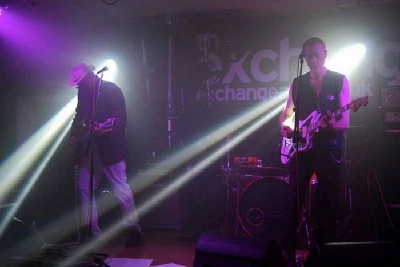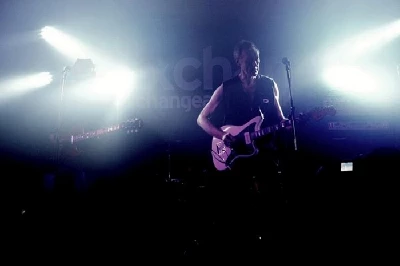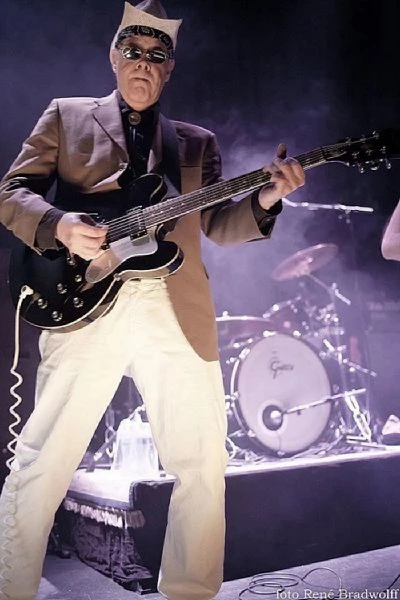published: 19 /
4 /
2017

John Clarkson talks to David Wolfenden, the guitarist with fiery post-punks and John Peel favourites Red Lorry Yellow Lorry about their new four CD box set, ‘Album and Singles 1982-1989'
Article
"We have always said that our favourite kind of music was classic Tamla Motown," says David Wolfenden. "And we wanted to use that as our template but to really fuck it up with the wildness of the MC5. That is what the Lorries’ programme is. That is the template for it."
He is talking about his band Red Lorry Yellow Lorry and a new box set, ‘Album and Singles 1982-1989’, which released by Cherry Red Records, compiles together the four albums and the assortment of other material - singles, B-sides and compilation tracks – that they put out in the 1980s.
An early post-punk band, Red Lorry Yellow Lorry formed in Leeds in 1981. Although they went through various line-up changes, they were centred around founder, vocalist and guitarist Chris Reed and Wolfenden, who also plays guitar and who joined Red Lorry Yellow Lorry in 1983 after the release of their first two singles, ‘Beating My Head’ and ’Take It All’.
Despite their playful choice of name, which comes from a children’s tongue-twister, Red Lorry, Yellow Lorry were a band of ferocious intensity, their music combining Reed’s doomy, deep vocals with relentless, taut drum machine sounds and layers of distorted guitar.
Red Lorry Yellow Lorry, who were one of influential DJ John Peel’s favourite bands, released their first two albums, ‘Talk about the Weather’ (1985) and ‘Paint Your Wagon’ (1986), on York-based label Red Rhino Records, before switching to Situation Two, which fell under the Beggars Banquet umbrella, for their third and fourth albums, ‘Nothing Wrong’ (1988) and ‘Blow’ (1989). Their fifth and final album, ‘Blasting Off’, which was released on the tiny Sparkhead label in 1991, was recorded by Reed with a new cast of musicians after Wolfenden had left the band.
Since Reed and Wolfenden reformed Red Lorry Yellow Lorry in 2004, they have toured Britain and Europe and have also worked on a new album. Pennyblackmusic spoke to David Wolfenden about Red Lorry Yellow Lorry’s history, and we began by talking about the new box set.
PB: You released a three CD compilation of your work ‘See the Fire’, as recently as 2014. Why have you decided to put out a second box set in ‘Albums and Singles’ so quickly?
DW: That was Cherry Red’s decision. They bought our back catalogue from Beggars Banquet and decided to do a complete collection of all our work. ‘See the Fire’ just features the Red Rhino back catalogue. This new one includes the back catalogue from Beggars Banquet. They have put everything together with the new box set in one package from both labels.
PB: Is it true that Chris Reed invited you to join Red Lorry Yellow Lorry a year before you finally did? Why did you turn him down at first and what changed your mind?
DW: I had been playing in a band called Expelaires which was a first generation post-punk band. That ran its natural course, and I just needed some time out to think what what I wanted to do next, and indeed if I wanted to join another band. He asked me at Expelaires' last gig if I wanted to join Red Lorry Yellow Lorry and I was pretty vague about it, but then he asked me again a year later by which time I felt okay within myself again and so we went for a drink and things went from there. They became pretty good with Red Lorry Yellow Lorry quickly.
PB: Wire was one of your major influences, yet you turned down the opportunity for Colin Newman from that band to produce your first album ‘Talk about the Weather’ and self-produced it instead. Why did you do that?
DW: It wasn’t my decision to turn him down and it will always rankle with me. We had a friend in Belgium who had done some stuff with Wire and who told us that he had asked Colin Newman if he would be interested in producing it and that Colin had said that he would love to do it. I think that Chris had a problem relinquishing control over to Colin. It is easy with hindsight to wish that you had done things differently, but I have always thought that it was a mistake.
PB: You were one of John Peel's favourite groups, weren’t you?
DW: Yeah, he liked the band. I think that he liked the silly name really. He also always liked the awkward jigsaw piece that didn’t fit which we were. I do think though at the end of the day the music stood up for itself really.
PB: Do you think that you would have broken through without his help?
DW: No, I don’t think so at all, and I don’t think we would be the only band that would say that either. Peel was a big fan of the Sisters of Mercy. He was an early champion of the Leeds post-punk scene in general, and the Gang of Four and the Mekons as well. There was no internet back then and the only way of hearing something challenging or leftfield was to tune into John Peel.
PB: Leeds had a fervent alternative musical scene in the early 1980s. As well as the the Sisters of Mercy, the Gang of Four and the Mekons, there was New Model Army, the Mission and Delta 5 as well. Did it seem special at the time?
DW: Not really. No. I think there was this myth that everyone was really good friends and that it was fairly cooperative. I was talking to a friend of mine the other night who he was in a Leeds band at the time, and when I got my first John Peel Session with Expelaires they were rehearsing at the time it was transmitted and the singer just stomped around the room shouting, "Bastards! Bastards! Why them?" There was an awful lot of rivalry. At one level there was creative interest and support, but it was also fairly competitive and we all tried to consistently outdo each other.
PB: Leeds is a city of factories and warehouses and was going through a lot of redevelopment in the 1970s and early 1980s. You have often been described as an industrial act. How much of an influence do you think that backdrop had either consciously or sub-consciously on your sound?
DW: I think that it is something that bands like us will inevitably absorb. Any decent art form has got to reflect what your environment is or what the climate is socially or politically at that time. In a way our music was a way of us trying to get out of Leeds. It was a fairly tough place and fairly claustrophobic, and I think the music seemed to be like people bursting out of a room or kicking the walls down. It was definitely us reacting against what was going on, and hopefully gave us some kind of control or empowerment over what we felt was wrong economically or politically.
PB: Yet were never seen to be a political band in the same way that, say, the Gang of Four were.
DW: I think that is true. The Gang of Four had a fairly overt political agenda. What we tried to do was couch it in a less obvious way, but I think though that a lot of the lyrics are fairly ambiguous and gave people the space to fill in the gaps and use their own imagination rather than force a really obvious left-wing agenda down their throats.
PB: You have said in the past that your main agenda was to make "mind blowing guitar music."
DW: Yeah. Both Chris and I had seen early Clash gigs and the Pistols at Leeds on the ‘Anarchy’ tour, and that was what we felt was that the onus of what was great live.
We were also big fans of the MC5, and we were heavily influenced by their live album, ‘Kick Out the Jams’, as well. We didn’t take from it sound wise. We took from it the idea of this band going crazy and not really worrying if they were a little bit out of tune but it being like a cathartic thing, almost like an exorcism. That was really our criteria for doing a gig, like it was the last gig that we would ever do. We loved the energy behind that album.
PB: You were frequently branded as a Goth band yet never saw yourself as a Goth band. Was that a source of frustration to you?
DW: Yes. I think that if we had seen ourselves as a Goth band we would have made life a lot easier for ourselves. We would have called ourselves like Sex Lorry Death Lorry, and we would have probably have sold a shit load more records and had a much better pension (Laughs).
It was never really about that though. Red Lorry Yellow Lorry for us was about standing alone and not being part of a movement and relying upon a movement to sell records. Lots of our peers did that and good luck to them, but once you have got a band with a name like ours then it is pretty hard to jump on a bandwagon. It always means that people who get it will really get it and that everyone else probably won’t. The problem was trying to break through barriers and people’s preconceptions and what the name suggested to people and what the music actually sounded like.
PB: You did well in the States. Why do you think that you went down so well over there?
DW: Because they don’t know what a lorry is (Laughs). People in the States thought that we were just a great rock and roll band and really that is all what we wanted to be. We didn’t want to be a great Goth band. We wanted to be a great post-punk/rock and roll band and the people in America took it as just that.
We did really well in Germany as well. The Goths were ironically really into us in Germany. We never really got it at the time, but looking back at it now with our black and white album covers and the dark subject matter of a lot of Chris’s lyrics it is understandable. We never contrived to be like that. We just wrote the best rock and roll songs that we could, and we also tried to be innovative along the way.
PB: You left the band in the early 1990s, having released with ‘Blow’ an album that you were pleased with and which many fans feel is one of your best albums. Why did you decide to split then?
DW: We were dropped by Beggar’s Banquet. We had spent a year doing that album. We did it in four blocks over the course of a year, and we really put everything that we ever had into it. The label said that they liked it, but when it came down to numbers on the balance sheet it didn’t add up so they had to let us go and that was devastating.
PB: You got back together in 2004. What is the situation with the band now?
DW: Chris has got some stuff going on in his personal life, and our hands are kind of tied at the moment until that gets resolved. We can’t really plan to do anything until things become clearer.
We have finished a new album called ‘Strange Kind of Paradise’. The people I have played it too really like it. We really like it. Sonically it is a 2013 record, which is when it was recorded. It pulls no punches. It has everything that Lorries’ fans like – it features some great songwriting on it and is very well-produced. Hopefully it will see the light one day. It is too good not to, but it is Chris’s band and we do have to respect where he is at personally at the moment.
PB: You are now back with Expelaires, aren’t you?
DW: Yeah, we are actually playing a gig tomorrow night. It is going well. We have recently released an album which has had good reviews in Louder Than War and Vive Le Rock. It keeps me busy in the absence of doing Lorries' stuff.
PB: Thank you.
Band Links:-
http://www.red-lorry-yellow-lorry.com/
https://www.facebook.com/rlylofficial
Picture Gallery:-



